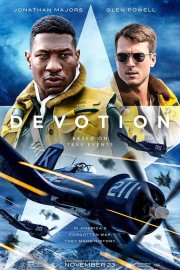Devotion
“Devotion” is a film that touches on familiar themes and ideas we’ve seen in a number of films before. A friendship between a Black man and a white man? Yes. The moments where the Black character tries to explain the systemic racism he’s endured in a way the white character will understand? Yes. The post-script where we learn the friendship endured through the decades? We get that as well. But what makes J.D. Dillard’s film so effective in this arena is how he builds that friendship to where it means something beyond just making us feel good about how Black and white characters managed to get along at a time when it was sometimes easier to hate someone for the color of their skin, and build a friendship on respect, and genuine care for one another.
The more I’ve seen of Jonathan Majors over the past few years, the more I think he’s going to be one of the great, lasting actors of his generation. Whether it’s as a part of an ensemble in Spike Lee’s “Da 5 Bloods,” someone trying to reclaim a house his grandfather built in “The Last Black Man in San Francisco,” a charismatic gunslinger out for revenge in “The Harder They Fall,” or the potential of what his Kang the Conqueror might be in the Marvel Cinematic Universe, I get excited to see what he’s got for us next. In “Devotion,” he plays Jesse Brown, a Naval pilot who has an instinctual nature to flying that makes him more of a wild card than the fact that he is Black. When Thomas Hudner Jr. (Glen Powell’s character) is paired up with him when he arrives at the training base in 1950, and the other pilots give him looks, we think it’s for racial reasons. But one of the strongest aspects of this film is how, to the other pilots in this squadron, Brown’s color of his skin really doesn’t matter, just how he flies the plane. That brotherhood is why “Devotion” connects with us, even when it feels as though it stretches its story out too long.
The Korean War is not one which readily has audience’s attention the same way World War II and Vietnam have when it comes to movies- I think “The Manchurian Candidate,” “M.A.S.H.” and “Inchon” are the most significant films on the war from American filmmakers. When the film opens, we see it called “The Forgotten War,” and that makes a sad degree of sense from a historical sense. It also ties into one of the ultimate themes of this film. When we first meet Hudner and Brown, they were not a part of the World War II. For Hudner, he joined because of Pearl Harbor, but he graduated just after fighting had ended. Meanwhile, he’s been waiting for his chance- he has a sense of adventure he needs to fill. Brown is more studious, sets himself apart from the rest of the squadron. His training, as we will learn, was filled with white officers pushing him- almost to the brink of death- and so, that is part of why he doesn’t spend a lot of time commiserating with the other pilots. He also has a wife, Daisy (Christina Jackson), and a daughter at home, and every moment we see with them is beautiful. Majors and Jackson build a bond in a handful of moments that lasts throughout the rest of the movie, as their squadron is sent off to potentially see their first combat.
One of the things that distinguishes “Devotion” the most from war movies is that the friendship between the main characters is the primary driving force of the film, rather than the war itself. Seeing these two men, whom need to prove themselves for very different reasons, bond is the most engaging aspect of the film. Counter that to something like “Pearl Harbor,” which tries to draw us into the friendship- and inevitable love triangle- before it devolves into just being able chronicling a moment in history. The script by Jake Crane and Jonathan Stewart (based on Adam Makos’s book) is certainly interested in the start of the Korean War, but it’s more about the fact that this squadron, and these people, bond as they prepare for their first combat that sticks with us. Powell and Majors are terrific at developing this friendship that is complicated for some reasons, but not necessarily some of the ones you would this. This is about showing us people who are devoted to each other, regardless of the circumstances, and it’s what we leave the film thinking about as the film ends.
Because of how the film almost de-emphasizes the combat in the narrative, “Devotion’s” 139 minutes sometimes feels a bit slow, but Dillard has crafted a film, and built characters, with these characters that leads to our emotions being with these people every step of the way. When the war does happen, it’s exceptionally crafted, and the drama of war is compelling. If we are not aware of the true story, the post-script is further emphasis on the idea of devotion that friends have for one another, that soldiers have for their own, and that family has for the people left behind. Devotion is more than just a way of expressing our love for someone, or an idea; it’s a way we should all lead our lives. That’s what this story gets to in the end, and it hits us hard with that idea.










